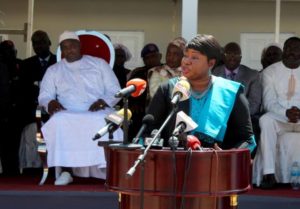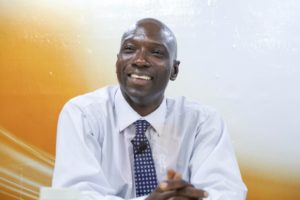Why hasn’t Fatou Bensouda indicted Yahya Jammeh at the ICC?

Dr. Ousman Gajigo
The testimonies over the past couple of weeks at the Truth, Reconciliation and Reparations Commission (TRRC) made for a compelling viewing. No one is quite surprised by all the crimes that occurred under Jammeh’s government. Yet, hearing first hand from the victims and Yahya Jammeh’s henchmen made for a disturbing experience. Not that we needed reminding, but it should put to rest any doubt that Yahya Jammeh was truly a monster. Which makes it all the more maddening to know that the former dictator lives in comfort in Equatorial Guinea. While he may be beyond the arms of Gambia’s law at this moment, he is not completely untouchable. Yahya Jammeh’s case is specifically tailor-made for the International Criminal Court (ICC).
Let’s simply recap some of his atrocities. Yahya Jammeh is accused of raping multiple Gambian women. These rapes occurred at the state house. On Yahya Jammeh’s orders, several individuals were murdered, including a prominent journalist Deyda Hydara. On Jammeh’s orders, scores of migrants, mostly from Ghana were massacred on Gambian soil. On Jammeh’s order, several Gambian soldiers were summarily executed without trial for attempting a coup d’état on 11th November 1996. On Yahya Jammeh’s orders, dozens of innocent civilians were accused of being witches, forced to drink concoctions of unknown origin, which killed some of them and caused debilitating injury to several others. Yahya Jammeh’s crimes went far beyond these horrible deeds.
Crimes of this nature have been the basis for indictments issued by the ICC. Since its creation, the ICC indicted about 34 individuals. For instance, in 2011 the ICC prosecutor filed a case against Laurent Gbagbo, the former president of Ivory Coast. The basis for his indictment included charges of murder, rape and other forms of sexual violence, persecution and inhuman acts during the post-election violence in Ivory Coast. Laurent Gbagbo’s wife, Simone Gbagbo, was also indicted. Even though she was undoubtedly powerful, her crimes and position of responsibility were not on the same level as her husband. Yet, she was indicted by the ICC.
ICC may not prosecute a case if domestic law enforcement and judicial system are sufficiently strong enough to bring individuals to justice. We can safely rule out the possibility that our justice system is capable and functional. After all, our Justice Minister announced to the world that his ministry cannot prosecute the so-called Junglers. The minister made this pronouncement even though some of the Junglers confessed, and witnesses and victims have made sworn testimonies that provided credible corroboration. Yet still, our Ministry of Justice has made it abundantly that they cannot or will not prosecute Yahya Jammeh and his henchmen. So the condition of deficient domestic investigation and prosecution is abundantly met in the case of Yahya Jammeh.
Building a case against Jammeh or issuing a warning against him did not need the testimonies made at the TRRC. Granted, those testimonies, particularly those made by the Jungulars would easily make a case against Yahya Jammeh almost a slam dunk. But there were not strictly needed. In many cases, investigators work diligently to build strong cases that rests on direct, as well as circumstantial evidence to tie suspects to crimes.
So why hasn’t Fatoumata Bensouda and the ICC still moved to indict Yahya Jammeh? Why hasn’t she indicted Jammeh when he was still in power? Why hasn’t she indicted him over the past three years as evidence of of his culpability abound?
So far, Mrs. Bensouda has not provided satisfactory answers even though she has had numerous opportunities to do so. In an interview with Deutsche Welle, the normally fluid speaker Mrs. Bensouda stumbled repeatedly in providing one unconvincing explanation after another as to why she did not move against Yahya Jammeh for his crimes. She claimed in that interview that what transpired in The Gambia did not fall under her mandate as the ICC prosecutor. This was blatantly false and she knows it. Unfortunately, that was far from the only false statement she made in that interview.
She tried to differentiate the Jammeh case from those that were referred to the ICC by the United Nations Security Council (UNSC). The fact is that the launch of investigations by the ICC against individuals need not come from the UNSC exclusively. The prosecutor can initiate them or they can be launched through invitation from the countries concerned. So, the failure to launch any action against Yahya Jammeh could not be explained away from the lack of referral by the UNSC.
Given the ICC’s powerful position, it does not always have to indict individuals to have an effect. Sometimes, just issuing a warning may have been enough to deter human rights abuses by those intending to do so. But Mrs. Bensouda never issued any warning against Yahya Jammeh. Yet, she issued warnings against countries such as Burundi and Nigeria, without uttering a hint of disapproval against Jammeh’s known crimes.
In an interview with Aljazeera in 2012, she refused to call Yahya Jammeh’s government a dictatorship. Let it sink in that this interview took place in 2012. There should not have been any doubt in the mind of anyone that Yahya Jammeh’s government was a dictatorship. She also claimed, incredulously, that her work as Justice Minister was never interfered with by Jammeh. This is contrary to all the evidence we now have before us at to how almost part of the government was made slave to the dictator’s goal of absolute control. She also claimed in that interview that she was proud of working in Jammeh government and she was “helping to move the country forward”. In what way did Mrs. Bensouda believe that The Gambia moved forward under Jammeh in terms of rule of law and justice? She was being blatantly dishonest.
Let’s be clear: it is not a crime to serve in government under Yahya Jammeh. It is possible to serve in the government of your country during a dictatorship without actively supporting or enabling a dictator. Many honorable Gambians did. What is a problem is the refusal to acknowledge a basic and obvious fact such as Jammeh being a dictator. It is having the audacity to falsely claim that Jammeh moved the country forward in terms of justice. What is especially morally questionable is the refusal to move against a brutal dictator even as one occupies a position of power created with that specific mandate, while busy indicting other leaders who were no less evil.
In a way, it is not surprising that Mrs. Bensouda was reticent in condemning Yahya Jammeh’s dictatorship. Because beyond just serving in government, it appears that she may not be untainted by the human rights abuses that occurred in that regime. At least two witnesses (Mr. Sainey Faye and Samba Jallow) testifying under oath at the TRRC fingered Mrs. Bensouda for leading their prosecution. Given the bogus crimes that these individuals were charged with, the proper word is persecution, rather than prosecution. These individuals were not only charged with bogus crimes, but they were tortured as well. This means that there is a strong possibility that Mrs. Bensouda may have some connections to human rights abuses under the Jammeh dictatorship. After all, as a prosecutor, she had a responsibility to look into the provenance of the evidence she was presented by the so-called investigators. Whether this connection is the reason for Mrs. Bensouda’s decision not go against Jammeh is anyone’s guess but it is hard to dismiss.
The attempted defense of Mrs. Bensouda by Essa Faal, the leader counselor of the TRRC and Justice Minister Tambedou, as reported in an exhaustive article by Thierry Cruvellier and Mustapha K Darboe in Kerr Fatou was insulting to the intelligence of Gambians. Both Mr. Faal and Mr. Tambedou, friends and colleagues of Mrs. Tambedou, claimed that whatever experience the TRRC’s witnesses underwent is not related to Mrs. Bensouda because she came at the “tail end” of things. Of course, a prosecutor’s work would come after the torture sessions that passed for investigations under the Jammeh’s regime. To claim that Mrs. Bensouda’s role came at the “tail ends” is an attempt to minimize her role in the murderous human rights violation machine that was the Jammeh regime. All those who played active roles, from the arresting officers to the prosecutors, played critical roles in the process, irrespective of how early or late in the process.
For more: Will Fatou Bensouda face the Truth Commission in Gambia?
Yet, despite all these unanswered questions, our current government has seen it fit to invite Mrs. Bensouda to the launching of the TRRC. This was a disgrace. It is a testament to her connection to key individuals in the government that she was given this prominent role despite these questions. One would have thought that she would have provided some thorough explanations before being given that privilege.
I would hope that Mrs. Bensouda’s role both in her failure to pursue a case against Yahya Jammeh and her possible role in human rights violations in the persecution of innocent people under the Jammeh regime are well cleared up before she is given any further significant role in a justice program in the country. It would make a mockery of the healing process in the country if she is somehow provided a soft landing such as being handed the Supreme Justice role after her term ends at the ICC while the above questions remain unanswered.

Ousman Gajigo is an economist. He has held positions with the African Development Bank, the UN, the World Bank and Columbia University. He holds a PhD in development economics. He is currently an international consultant and also runs a farm in The Gambia.


Comments are closed.